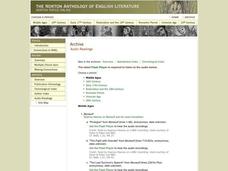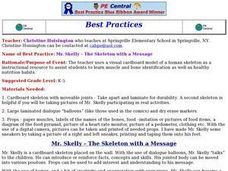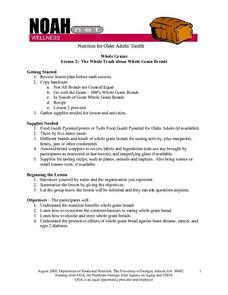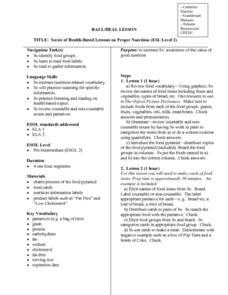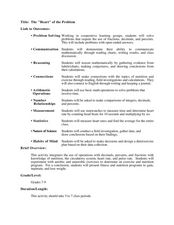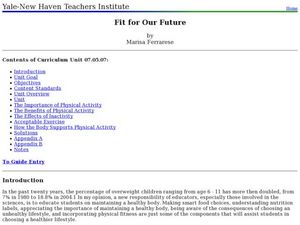Illustrative Mathematics
Quinoa Pasta 1
Here is a great opportunity to introduce your mathematicians to a food they may never have heard of, quinoa. It may help to show a short video on quinoa, or make some quinoa for the class to try. Once they get over how to say quinoa,...
Curated OER
Health: The Skeleton with a Message
Students identify human muscles and bones from a cardboard skeleton, named "Mr. Skelly." Using dialog balloons as props, the teacher holds up advice from Mr. Skelly, such as noting he drinks milk to keep his bones strong. The lesson...
Curated OER
Knowing your nutrients
Students comprehend the basics of the nutrition label. They comprehend the Recommended Daily Allowances. Students analyze the regulations that govern food labeling. They review the Food Pyramid.
Curated OER
Moooving to Low-fat Milk
Third graders complete two handouts. In this healthy beverages lesson, 3rd graders compare whole, two percent and skim milks. Students use labels to help choose healthy beverages. Students complete an "All About Milk" and "Calculating...
Curated OER
The Whole Trut about Whole Grain Breads
Students comprehend the nutrition benefits whole grain breads. They explore how to overcome the common barriers to eating whole grain bread. Students investigate how to choose and store whole grain breads. They comprehend the...
Curated OER
Hall/ Heal Lesson
Students review the food groups and vocabulary in order to define how good nutrition is part of good health. They read a variety of articles in order to better understand the concept and develop reading comprehension at the same time.
Curated OER
Dietary Fiber Introduction
Students identify fiber from foods, its sources and function in the body. They also the importance of fiber in the diet and good food sources that one can eat. Finally, students discuss water and its importance with eating fiber and...
Curated OER
Hunting for Hidden Fat
Students investigate the importance of fat in the diet. They determine the difference between solid and liquid fat. They examine food labels to identify the ones that contain fat.
Curated OER
Fun with Food: Hola Jalapeno
Students engage in an at-home instructional activity on language. It contains components that address Adult Education/ESOL, and age appropriate activities for Toddler, Preschool and School aged Students. Adults reinforce steps to prepare...
Curated OER
St. Patrick's Day Snack
First graders decide on and prepare a nutritious snack that is green.
Curated OER
Heart Healthy
Students assess their risk of heart disease. In this adult health lesson, students differentiate saturated and unsaturated fats. They discuss different heart healthy food ideas.
Curated OER
Get Nutty
Students research how nuts and seeds contribute to their overall good health.They recognize that nuts and seeds are a tasty addition to a meal. Students comprehend that nuts and seeds pose a risk for a small proportion of the population...
Curated OER
Making a Grocery List
High schoolers explore vocabulary words related to groceries. Students examine words that can be used immediately, in every day life, particularly in the grocery store. They demonstrate the sounds of letters. High schoolers match labels...
Curated OER
Fit For Life: Eat Smart and Exercise
Students examine the problem of obesity among teenagers. They view a video and discuss what could be done to avoid becoming overweight. They also explore the importance of exercise.
Curated OER
The "Heart" of the Problem
Students create an exercise and nutrition program. In this interdisciplinary lesson plan, students use calculations of exercises plus their corresponding effects on the body and nutritional values of food to derive a health plan....
Curated OER
Trophic Ecology of Humans
students analyze the place of humans among the tropic levels by observing what we eat. They calculate the caloric content of several foods commonly eaten by humans and calculate the total energy cost to grow, process, transport, store...
Curated OER
Trophic Ecology of Humans
Students analyze the trophic level of humans by first calculating the kilocalories in own their lunch. They then calulate the kilocalories in a wide variety of foods found in grocery stores and compare the kilocalories needed to acquire...
Curated OER
Fit for Our Future
Students understand the importance of physical fitness as part of a healthy lifestyle. In this health lesson students create a display and presentation about what they learned.
Curated OER
Yo! Gert-making yogurt
Young scientists or chefs culture yeast to produce yogurt. The materials and a general description of how make yogurt are provided, but there is very little detail otherwise. You could use this as an activity when your biology class is...
Curated OER
Pour Some
Students compare their desired portions with the actual serving size. In this lesson on serving size, students compare their desired portion of a given food with the actual serving size listed on the Nutritional Facts label.
Curated OER
Beef Is Good For You
Learners discuss as a class the need for a healthy diet. They bring in a food product and analyze the nutrition label. Using the labels, they complete a worksheet and chart the nutrients found in beef. They use a scale to see how...
Curated OER
Understanding Portion Sizes
Students analyze portion sizes in a healthy diet. In this portion sizes lesson, students complete a food group choices worksheet and identify the correct portion of food. Students work in groups to teach the unit to elementary students....
Curated OER
Peanuts
Students explore the benefits of peanuts. In this peanut activity, students explore the nutritional benefits of peanuts as they complete worksheet activities.
Curated OER
A Helthy Diet
Students examine their eating habits and experience analyzing data and drawing conclusions. They construct models of the molecular backbone of saturated and unsaturated fats. In addition, they examine the labels of their food, record...


